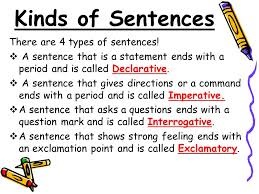A sentence is a group of words that expresses a complete thought. It typically contains a subject and a verb. Sentences can be categorized based on their purpose and structure. In this chapter, we will explore the different types of sentences: Affirmative, Interrogative, Imperative, Exclamatory, and Negative.
- Affirmative Sentences
An affirmative sentence is a statement that provides information or declares something. It is also called a declarative sentence. It always ends with a period or full stop (.).
Examples:
– The sun rises in the east.
– She loves to play the piano.
– They are going to the park.
- Interrogative Sentences
An interrogative sentence asks a question. It always ends with a question mark (?).
Examples:
– What is your name?
– Are you coming to the party?
– Where do you live?
- Imperative Sentences
An imperative sentence gives a command, request, or instruction. It can end with a period (.) or an exclamation mark (!) depending on the tone.
Examples:
– Please close the door.
– Do your homework.
– Be quiet!
- Exclamatory Sentences
An exclamatory sentence expresses strong emotion or excitement. It always ends with an exclamation mark (!).
Examples:
– What a beautiful day!
– I can’t believe we won!
– How amazing this is!
- Negative Sentences
A negative sentence denies or negates something. It often uses words like not, no, never, etc.
Examples:
– I do not like broccoli.
– She has never been to Paris.
– They are not coming to the meeting.

















